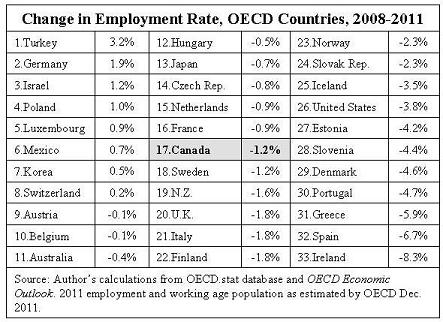Prime Minister Harper went to Davos yesterday to sing Canada’s praises. No sooner had he finished reciting a long list of our national achievements, however, he launched into a list of the sober, realistic, inevitable things that must be done in Canada to ensure “sustainability” in the long term. Top of the list is rolling back our universal public pension system (especially targeting the OAS and the GIS), which is one of our genuine national achievements. Harper plans to use his majority power and adept use of “shock doctrine” ideology to try to do what others (including Mulroney and Martin) failed: roll back this most important component of our sadly-inadequate pension system. I hope that everyone with a stake in this — seniors, labour, anti-poverty groups — are ready to fight him on it. This could be the issue where Harper over-reaches, majority and all.
But the obvious question is this: if Canada has been so wonderfully successful, why must we take money away from Canada’s pensioners (let alone all the other blood that’s clearly going to spilled with this 2012 budget)?
The triumphalism of the federal government throughout the global crisis (which is still very much with us, as the IMF powerfully warned the other day) has become increasingly far-fetched, but the Harper government shows no shame in continuing to milk it for all it’s worth.
A paper I wrote for the Alternative Federal Budget compiles international and historical data to show that there’s no empirical basis for the twin boasts that: 1. the economic damage from the recession has been repaired, and 2. Canada escaped the worst of the downturn (compared to other countries).
Here’s a link to the full paper, released yesterday by the CCPA.
Adjusting for population growth (a no-brainer when making any historical or international comparisons of absolute variables like GDP and employment), Canada has not remotely regained the ground lost to the recession. Per capita real GDP is well below its pre-recession levels (and at least $3,000 per person below its potential, given pre-recession trends). The employment rate has recovered even more poorly: not even one-fifth of the downturn in that crucial measure of labour market well-being has been recouped in two-and-a-half years of non-recovery since mid-2009.
Internationally, if there is one word to summarize Canada’s relative performance through this recession, it should be “mediocre.” Canada ranks 17th out of 34 OECD countries in real per capita GDP growth since the pre-recession peak, and 17th out of 33 in the cumulative change in the employment rate (see table below).

Yes, we’ve done better than countries which experienced major banking or financial failures: the U.S., the U.K., Ireland, Iceland, and Greece. But among industrialized countries which did not suffer bank failures, we rank relatively poorly. Instead of continually boasting that we’ve done better than the Americans or the Greeks, we should be asking why we haven’t done nearly as well as the Germans, the Koreans, or the Australians in recovering from recession. The premature cessation of fiscal stimulus, the devastating impacts of currency overvaluation, and the longer-run failure to pursue successful sector-based development strategies, all loom large in answering this question.
The government’s continuing claim that Canada has done so well, is an insult to the many millions of Canadians who have suffered real harm, and continue to suffer real harm, as a result of the recession, and Canada’s incomplete, mediocre recovery from it.
Jim Stanford is an economist with CAW. This article was first posted on the Progressive Economics Forum.
Dear rabble.ca reader… Can you support rabble.ca by matching your mainstream media costs? Will you donate a month’s charges for newspaper subscription, cable, satellite, mobile or Internet costs to our independent media site?



